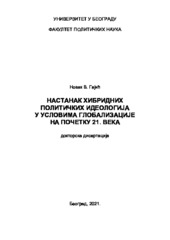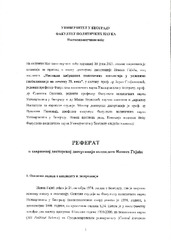Prikaz osnovnih podataka o disertaciji
Настанак хибридних политичких идеологија у условима глобализације на почетку 21. века
The emergence of hybrid political ideologies in the context of globalisation at the beginning of the 21st century
| dc.contributor.advisor | Pavlović, Vukašin | |
| dc.contributor.other | Stojiljković, Zoran | |
| dc.contributor.other | Orlović, Slaviša | |
| dc.contributor.other | Đurković, Miša | |
| dc.creator | Gajić, Novak | |
| dc.date.accessioned | 2021-12-15T10:30:27Z | |
| dc.date.available | 2021-12-15T10:30:27Z | |
| dc.date.issued | 2021-09-30 | |
| dc.identifier.uri | http://eteze.bg.ac.rs/application/showtheses?thesesId=8408 | |
| dc.identifier.uri | https://fedorabg.bg.ac.rs/fedora/get/o:24638/bdef:Content/download | |
| dc.identifier.uri | http://vbs.rs/scripts/cobiss?command=DISPLAY&base=70036&RID=52975625 | |
| dc.identifier.uri | https://nardus.mpn.gov.rs/handle/123456789/18740 | |
| dc.description.abstract | Ова дисертација бави се идеолошким трансформацијама у демократским друштвима у условима глобализације на почетку 21. века. У њој је изнета минимална дефиниција идеологије као скупа политичких идеја о начелима устројства заједнице, чија је сврха да надахне спровођење тих идеја и да их оправда. Она је развијена на претпоставци да феномен идеологије има два основна елемента — садржај (идеје о начелима устројства заједнице) и сврху (надахњивање спровођења и оправдавање тих идеја). У овој дисертацији идеологије су проучаване према њиховом садржају, а не према контекстуалном позиционирању на левицу и десницу, па су за основне аналитичке јединице узете три велике идеолошке породице — либерализам, социјализам и конзервативизам. Стога је употребљена и додатно развијена теоријска парадигма хибридних идеологија, досад веома ретко коришћена, којој је дата предност у односу на теорију потковице којом се објашњава појава приближавања крајње левице и крајње деснице. Пошто се процес идеолошког хибридизовања догађа у домену идеолошког садржаја, хибридна идеологија се разуме као идеологија чији је садржај настао мешањем или комбиновањем елемената садржаја различитих већ постојећих идеологија. Хибридне идеологије стављене су у општи контекст идеологија развијањем нове типологије, наслоњене на поделу идеологија према обухвату њиховог садржаја на целовите и уско усредсређене, коју је увео Мајкл Фриден, а којој су додате још две категорије идеологија — редуковане и хибридне. Упоредном историјском анализом хибридних идеологија, њихов настанак и развој разврстан је у пет историјских таласа: друга половина 19. века, међуратно раздобље, време после Другог светског рата, крај 20. века и почетак 21. века. Последња два обележена су глобализацијом. Током четвртог таласа одвијао се процес деидеологизовања политике, а током петог реидеологизовања. У дисертацији је установљено да је глобализација у четири своја аспекта — политичком, економском, демографском и информационом — кључно утицала на настанак хибридних идеологија на почетку 21. века. | sr |
| dc.description.abstract | This dissertation concentrates on ideological transformations in democratic societies in the context of globalisation at the beginning of the 21st century. A minimal definition of ideology is proposed, which says that it is a set of political ideas on the principles of organising a polity, with the purpose to inspire the implementation of these ideas and to justify them. It has been developed on the assumption that the phenomenon of ideology has two basic elements: content (ideas on the principles on organising a polity) and purpose (inspiring the implementation of these ideas and to their justification). Ideologies are in this dissertation studied through their content, rather than through the contextual left-right positioning, so its basic analytical units are three great ideological families: liberalism, socialism, and conservatism. For this purpose, a rarely used theoretical paradigm of hybrid ideologies is employed and further developed, rather than the horseshoe theory which aims to explains the phenomenon of closeness between the extremes left and the extremes right. Since the process of ideological hybridisation takes place in the domain of ideological content, a hybrid ideology is seen as an ideology with a content developed through mixing or combining the elements of contents of some already existing ideologies. Hybrid ideologies are also placed within a general context of ideologies, by developing a new typology, which rests on Michael Freeden’s differentiation of full and thin-centred ideologies, depending on the scope of their content. Two new categories have been added: reduced and hybrid ideologies. A comparative historical analysis of the emergence and development of hybrid ideologies was undertaken, and five historical waves have been identified: second half of the 19th century, interwar era, period after World War II, the end of the 20th century, and the beginning of the 21st century. The ultimate two waves have been marked by globalisation. The fourth wave saw the process of deideologisation of politics, while the fifth sees its reideologisation. The dissertation concludes that globalisation had a key impact on the emergence of hybrid ideologies at the beginning of the 21st century, through its four aspects: political, economic, demographic, and informational. | en |
| dc.format | application/pdf | |
| dc.language | sr | |
| dc.publisher | Универзитет у Београду, Факултет политичких наука | sr |
| dc.rights | openAccess | en |
| dc.rights.uri | https://creativecommons.org/licenses/by-nc/4.0/ | |
| dc.source | Универзитет у Београду | sr |
| dc.subject | идеологија | sr |
| dc.subject | ideology | en |
| dc.subject | глобализација | sr |
| dc.subject | хибридне идеологије | sr |
| dc.subject | идеолошки садржај | sr |
| dc.subject | историјски таласи идеолошког хибридизовања | sr |
| dc.subject | деидеологизовање | sr |
| dc.subject | реидеологизовање | sr |
| dc.subject | globalisation | en |
| dc.subject | hybrid ideologies | en |
| dc.subject | ideological content | en |
| dc.subject | historical waves of ideological hybridisation | en |
| dc.subject | deideologisation | en |
| dc.subject | reideologisation | en |
| dc.title | Настанак хибридних политичких идеологија у условима глобализације на почетку 21. века | sr |
| dc.title.alternative | The emergence of hybrid political ideologies in the context of globalisation at the beginning of the 21st century | en |
| dc.type | doctoralThesis | |
| dc.rights.license | BY-NC | |
| dcterms.abstract | Павловић, Вукашин; Стојиљковић, Зоран; Ђурковић, Миша; Орловић, Славиша; Гајић, Новак; Nastanak hibridnih političkih ideologija u uslovima globalizacije na početku 21. veka; | |
| dc.identifier.fulltext | http://nardus.mpn.gov.rs/bitstream/id/77751/Referat.pdf | |
| dc.identifier.fulltext | http://nardus.mpn.gov.rs/bitstream/id/77750/Disertacija.pdf | |
| dc.identifier.rcub | https://hdl.handle.net/21.15107/rcub_nardus_18740 |



